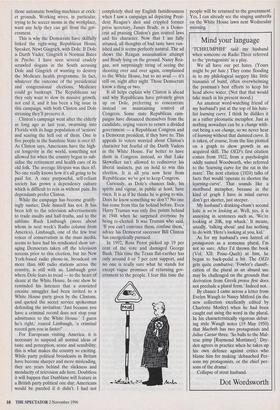Mind your language
`TCHRUMPHH!' said my husband when someone on Radio Three referred to the 'protagonists' in a play.
We all have our pet hates. (Yours might be pet hate.) They come flooding in to my philological surgery like little tsunamis of bumf, often overwhelming the postman's best efforts to keep his head above water. (Not that that would take much in his present mood.) An amateur word-watching friend of my husband's put at the top of his hate- list learning curve. I think he dislikes it as a rather pleonastic metaphor. Just as nothing nowadays can be a change with- out being a sea change, so we never hear of learning without that damned curve. It is taken, of course, from the line plotted on a graph to show growth in an acquired skill. The OED's first citation comes from 1922, from a psychologist oddly named Woodworth, who referred to the 'learning curve for the rat in the maze'. The next citation (1924) talks of facts that would 'operate to shorten the learning-curve'. That sounds like a moribund metaphor, because in the kind of graph I have in mind curves don't get shorter, just steeper.
My husband's drinking-chum's second hate is we're looking at. Well, yes, it is annoying in sentences such as, 'We're looking at 20K, top whack.' It means, usually, 'talking about' and has nothing to do with 'Here's looking at you, kid.'
As for my husband's own hatred of protagonists as a nonsense plural, I'm not so sure. After I'd thrown the book (Vol. XII: Poise-Quelt) at him, he began to back-pedal a bit. The OED gets quite combative: 'Fowler's classifi- cation of the plural as an absurd use may be challenged on the grounds that derivation from Greek protos first does not preclude a plural form.' Indeed not.
By chance I came across a letter from Evelyn Waugh to Nancy Mitford (in the new collection excellently edited by Charlotte Mosley) when he had been caught out using the word in the plural. In his characteristically vigorous debat- ing style Waugh notes (19 May 1950) that Macbeth has two protagonists and Julius Caesar three. 'So balls to the Mal- tese pimp [Raymond Mortimer].' Dry- den agrees in practice when he takes up his own defence against critics who blame him for making 'debauched Per- sons my protagonists, or the chief per- sons of the drama'.
Collapse of stout husband.
Dot Wordsworth


















































































 Previous page
Previous page